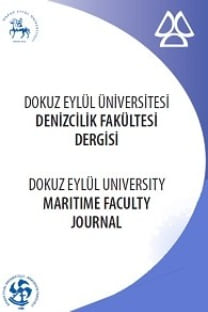GEMİLERDE ENERJİ VERİMLİLİĞİNİ SAĞLAMAVE SERA GAZI SALIMLARINI AZALTMAYA YÖNELİK UYGULAMALAR: BİR ODAK GRUP ÇALIŞMASI
Donatan işletmeleri, enerji verimliliği, sera gazı salımları, odak grup çalışması
THE PRACTICES THAT REDUCE GREENHOUSE GASES EMISSIONS AND IMPROVE ENERGY EFFICIENCY IN SHIPS: A FOCUS GROUP STUDY
___
- Agnolucci, P., Smith, T., & Rehmatulla, N. (2014). Energy efficiency and time charter rates: Energy efficiency savings recovered by ship owners in the Panamax market. Transportation Research Part A: Policy and Practice, 66, 173-184.
- Altunışık, R., Coşkun, R., Bayraktaroğlu, S., & Yıldırım, E. (2010). Sosyal Bilimlerde Araştırma Yöntemleri: SPSS uygulamalı. İstanbul: Sakarya Yayıncılık. ISBN, 978-605-4229-09-3.
- Buhaug, Ø. and Corbett, , J.J. and Endresen, Ø. and Eyring, V. and Faber, J. and Hanayama, S. and Lee, D. S. and Lee, D. and Lindstad, H. and Markowska , A.Z. and Mjelde, A. and Nelissen, D. and Nilsen, J. and Pålsson, C. and Winebrake, J.J. and Wu, W.–Q. and Yoshida, K. (2009) Second IMO GHG study .
- Cabezas-Basurko, O., Mesbahi, E., & Moloney, S. R. (2008). Methodology for sustainability analysis of ships. Ships and Offshore Structures, 3(1), 1-11.
- De Marco, A., Mancini, S., Pensa, C., Calise, G., & De Luca, F. (2016). Flettner rotor concept for marine applications: A systematic study. International Journal of Rotating Machinery, 2016.
- DNVGL(2017).ErişimTarihi:11.10.2017,https://www.dnvgl.com/maritime/eu-mrv-regulation/index.html.
- EC (2017). Erişim Tarihi: 11.10.2017, https://ec.europa.eu/clima/ policies/transport/shipping_en.
- IMO (International Maritime Organization, Uluslararası denizcilik Örgütü). (2017). Erişim Tarihi: 11.10.2017, http:// www. imo. org/ en/ OurWork/environment/pollutionprevention/airpollution/pages/air-pollution.aspx)
- ISO (Uluslararası Standartlar Örgütü, International Organization for Standardization) (2017). Erişim Tarihi: 11.10.2017, https: // www. iso.org/standard/64247.html.
- Maddox Consulting. (2012). Analysis of market barriers to cost effective GHG emission reductions in the maritime transport sector, Erişim Tarihi:11.10.2017,https://ec.europa.eu/clima/sites/clima/files/transport/shipping/docs/market_barriers_2012_en.pdf.
- Malhotra, N. K. (2007). Marketing research an applied orientation. Pearson Prentice Hall, Upper Saddle River, NJ 07458.
- MAN, Slide Fuel Valve PrimeServ Retrofitting, Erişim Tarihi: 11.10.2017, http://primeserv.man.eu/docs/librariesprovider5/primeserv-documents/slide-fuel-valve.pdf?sfvrsn=2.
- Talay, A. A., Deniz, C., & Durmuşoğlu, Y. (2014). Gemilerde verimi arttırmak için uygulanan yöntemlerin CO2 emisyonlarını azaltmaya yönelik etkilerinin analizi. Journal of ETA Maritime Science, 2(1), 61-74.
- Ryste, J. M. (2012). Screening LCA of GHG emissions related to LNG as ship fuel (Master's thesis, Norwegian University of Science and Technology, Department of Marine Technology).
- Veenstra, A. W., & Van Dalen, J. (2011). Ship speed and fuel consumption quotation in ocean shipping time charter contracts. Journal of Transport Economics and Policy (JTEP), 45(1), 41-61.
- ISSN: 1309-4246
- Yayın Aralığı: 2
- Başlangıç: 2009
- Yayıncı: Dokuz Eylul Üniversitesi Matbası
ALİ ENDER ALTUNOĞLU, DERYA ATLAY IŞIK, Ramazan ERBİLGİN
Ali Yasin Kaya, Kadir Emrah Erginer
VERİ ZARFLAMA ANALİZİ YÖNTEMİYLE TÜRK GEMİ İNŞA SANAYİNİN ETKİNLİK DEĞERLENDİRMESİ
Abdullah Açık, Egemen Ertürk, Bayram Bilge Sağlam
UZAYAN LİMAN ÖZELLEŞTİRME SÜRECİNİN ETKİLERİ: İZMİR ALSANCAK LİMANI VAKA ÇALIŞMASI
İSMAİL BİLGE ÇETİN, Gökçay BALCI, SONER ESMER
ÇEVRESEL BİR DEĞİŞKEN OLARAK KRİZİN YAT KİRALAMA ACENTALARININ REKABET STRATEJİLERİNE ETKİSİ
